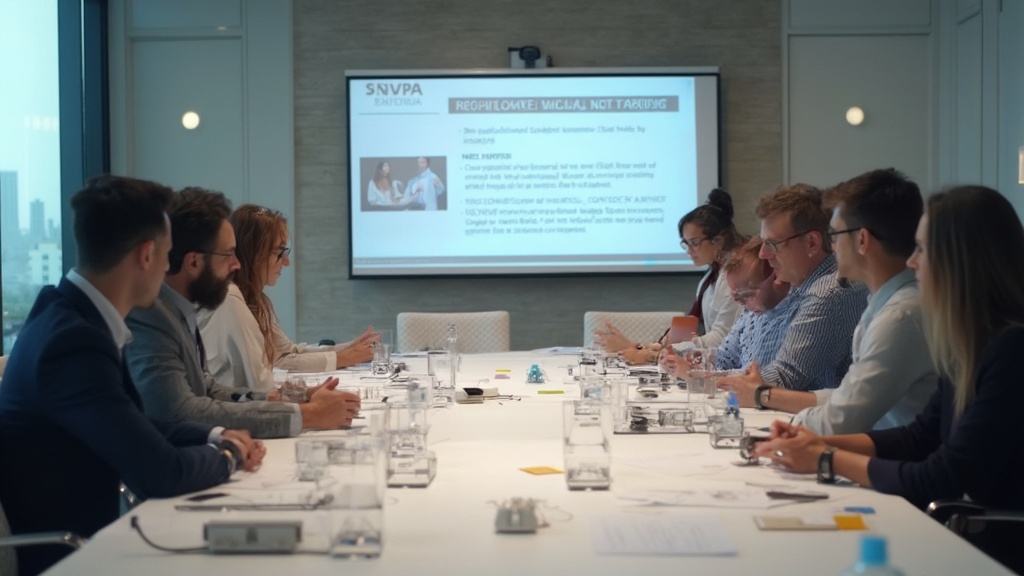


In recent years, Brazil has witnessed transformative legislative changes that are reshaping the landscape of clinical research. The introduction of new regulations by the Brazilian Health Regulatory Agency (ANVISA) aims to streamline the approval processes for clinical trials, particularly those involving medical devices. This initiative not only enhances transparency and efficiency but also aligns Brazilian practices with international standards, fostering an environment conducive to innovation.
As the country prepares to host major global events, these reforms position Brazil as a leader in clinical research, offering researchers the opportunity to expedite trials and improve patient access to groundbreaking therapies. Understanding the implications of these changes is crucial for stakeholders aiming to navigate the evolving regulatory framework and harness the potential benefits for their clinical studies.
Brazil has recently experienced important legislative alterations intended to improve and simplify research processes. A key advancement is the new regulation implemented by the Brazilian Health Regulatory Agency (ANVISA), which aims at streamlining the approval process for studies involving medical devices. This legislation emphasizes transparency, efficiency, and alignment with international standards, offering researchers and institutions the chance to accelerate approvals and enhance patient access to innovative therapies.
bioaccess® utilizes over 20 years of expertise in managing comprehensive trial services, including:
ensuring successful outcomes for Early-Feasibility, First-In-Human, and other pivotal studies.
Dr. Eduardo de Oliveira, Supervising Physician of Internal Medicine Residency, highlights the importance of these advancements, stating, 'UpToDate's impact on the quality of care is impressive and has become indispensable for professional practice. I do not perform any service without having UpToDate opened.' This emphasizes the necessity for medical researchers to utilize trusted resources in the evolving regulatory landscape, particularly as they navigate new approval processes.
As Brazil gets ready to host major international events such as the G-20 and COP30, these legislative changes not only demonstrate a commitment to improving local medical studies but also establish Brazil as a leader in global governance. The effect of Medtech research on local economies, including job creation and healthcare enhancement, is further intensified through partnerships like that between Greenlight Guru and bioaccess™, focused on accelerating Medtech innovations and studies in the region.
To maintain competitiveness in the medical study environment, scientists must stay informed about ongoing revisions and updates to regulations. Moreover, including particular statistics or case studies illustrating the tangible effects of these new regulations on efficiency and patient outcomes would reinforce the advantages of these advancements for the medical community.
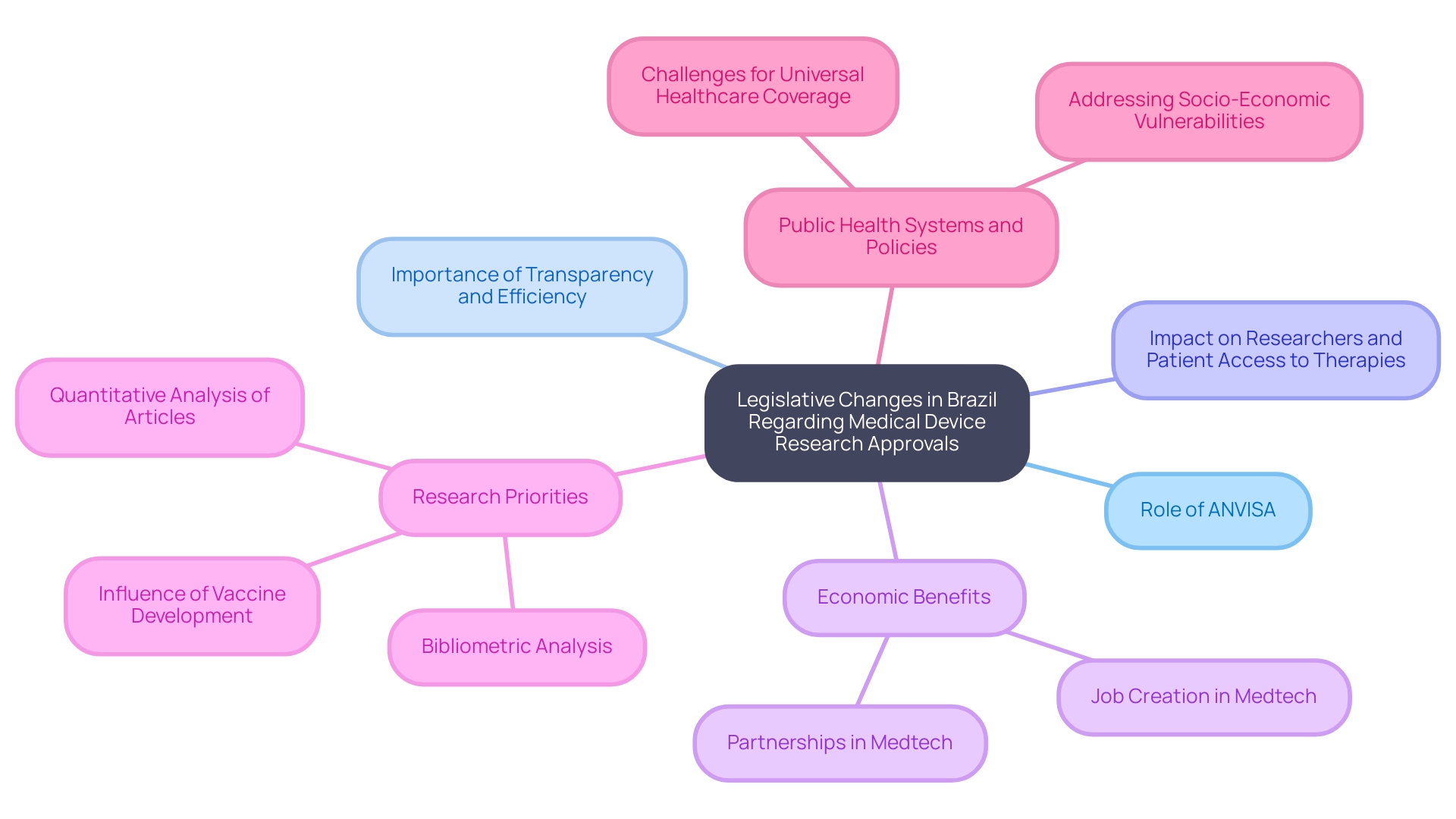
The regulatory structure for medical studies in Brazil is primarily overseen by ANVISA, the National Health Surveillance Agency. ANVISA plays a crucial role in supervising the approval process for research involving medical devices and pharmaceuticals. This entails the submission of detailed study protocols, comprehensive informed consent documents, and strict adherence to Good Clinical Practice (GCP) guidelines. As of 2024, Brazil has reported that over 75% of clinical studies successfully meet ethical standards, reflecting a commitment to participant welfare and contributing to comprehensive clinical study management services.
Ethical considerations are of utmost importance in this context. Clinical studies must prioritize the safety and welfare of participants, ensuring transparent and comprehensive informed consent. Engaging with ethics committees early in the trial design phase is highly recommended to preempt and address potential ethical challenges. This proactive approach is essential for maintaining the integrity of the study process and safeguarding participant rights.
Furthermore, the Chatham House Rule, which encourages open dialogue by permitting attendees to utilize the information obtained without disclosing identities, highlights the significance of confidentiality and ethical communication in professional settings. This principle is widely utilized by local governments, commercial organizations, and academic institutions to foster candid communication, particularly in discussions surrounding regulatory compliance and ethical standards in trials.
In the changing environment of healthcare studies, the partnership between Iron Mountain and Akamai illustrates the effective balance of commercial and ethical requirements. This partnership supports the achievement of both business and sustainability goals, illustrating the broader impact of ethical practices in research, which ultimately contributes to job creation and economic growth in local economies.
Grasping and maneuvering through these regulations and ethical factors are essential for effectively carrying out studies in Brazil, ensuring compliance, and maintaining the highest standards of participant care. Katherine Ruiz, a Regulatory Affairs expert with extensive experience in medical device and in vitro diagnostic regulations, plays a pivotal role in guiding foreign manufacturers through the complexities of obtaining market clearance in Colombia. Her expertise enhances the credibility of research studies and underscores the significance of regulatory compliance in promoting economic growth and improving healthcare results in the region.
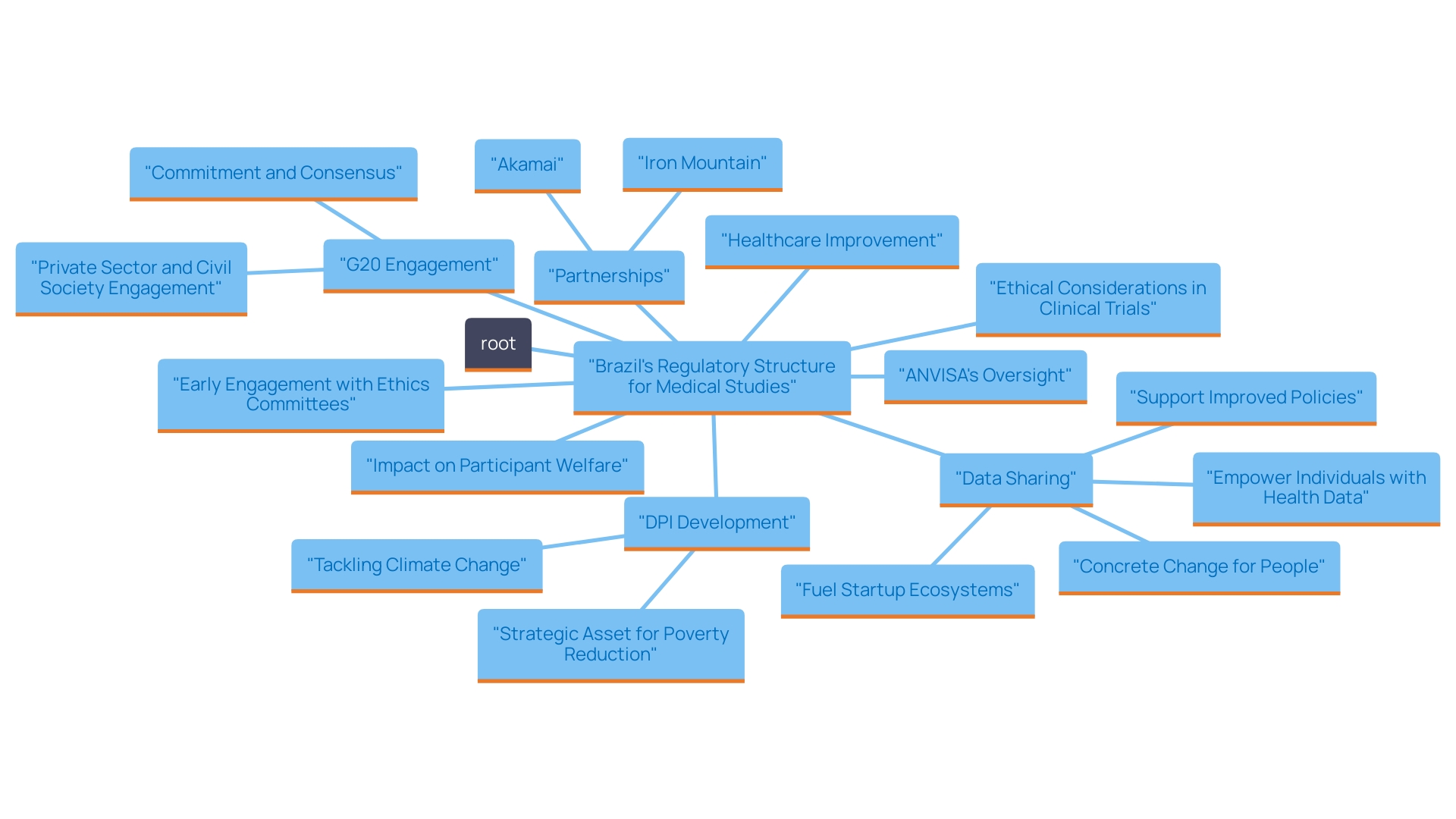
Organizing a clinical study for medical devices in Brazil requires meticulous attention to several key steps to ensure compliance with regulatory standards and successful execution.
Define Objectives: Clearly outline the study's objectives and desired outcomes. Establishing these parameters ensures alignment with regulatory requirements and meets stakeholders' expectations.
Design Protocol: Develop a comprehensive study protocol that encompasses methodology, sample size, endpoints, and statistical analysis plans. Effective protocol design is essential and must align with Brazil's specific regulatory requirements for medical device testing, ensuring that all necessary guidelines are followed.
Regulatory Submission: Prepare and submit the necessary documentation to ANVISA and local ethics committees for approval. This step is vital for ensuring that the study adheres to rigorous standards and ethical considerations. Comprehending Brazil's regulatory environment is crucial, as it can affect the timeline for approvals and the overall study design.
Site Selection: Identify and select clinical study sites based on their capability, resources, and patient population. Choosing diverse locations can improve the study’s generalizability and relevance, especially in urban centers with varied demographics. Additionally, bioaccess® specializes in the feasibility and selection of research sites, ensuring optimal conditions for study execution.
Recruitment Strategies: Implement effective strategies for participant recruitment, ensuring that informed consent protocols are strictly followed. Successful case studies from earlier experiments in Brazil show that community engagement can significantly enhance recruitment rates. Addressing the challenges of prolonged subject recruitment is crucial for timely study completion.
Monitoring and Compliance: Establish a comprehensive monitoring plan to ensure adherence to regulatory requirements throughout the study's duration. Continuous monitoring is essential to maintain the trial’s integrity and address any issues promptly. Bioaccess® offers extensive study project management and monitoring services to support this process.
Information Management: Ensure efficient information collection and management processes to facilitate accurate reporting and analysis. Efficient information management is critical for analyzing study results and preparing for peer-reviewed publications. Leveraging electronic data capture systems can streamline this process and enhance data accuracy.
By adhering to these essential steps and comprehending the regulatory environment, researchers can maneuver through the intricacies of study execution in Brazil, ensuring compliance and upholding ethical integrity throughout the process. Following these best practices not only aids in attaining successful results but also promotes medical device innovation, backed by the extensive research management services provided by bioaccess®.
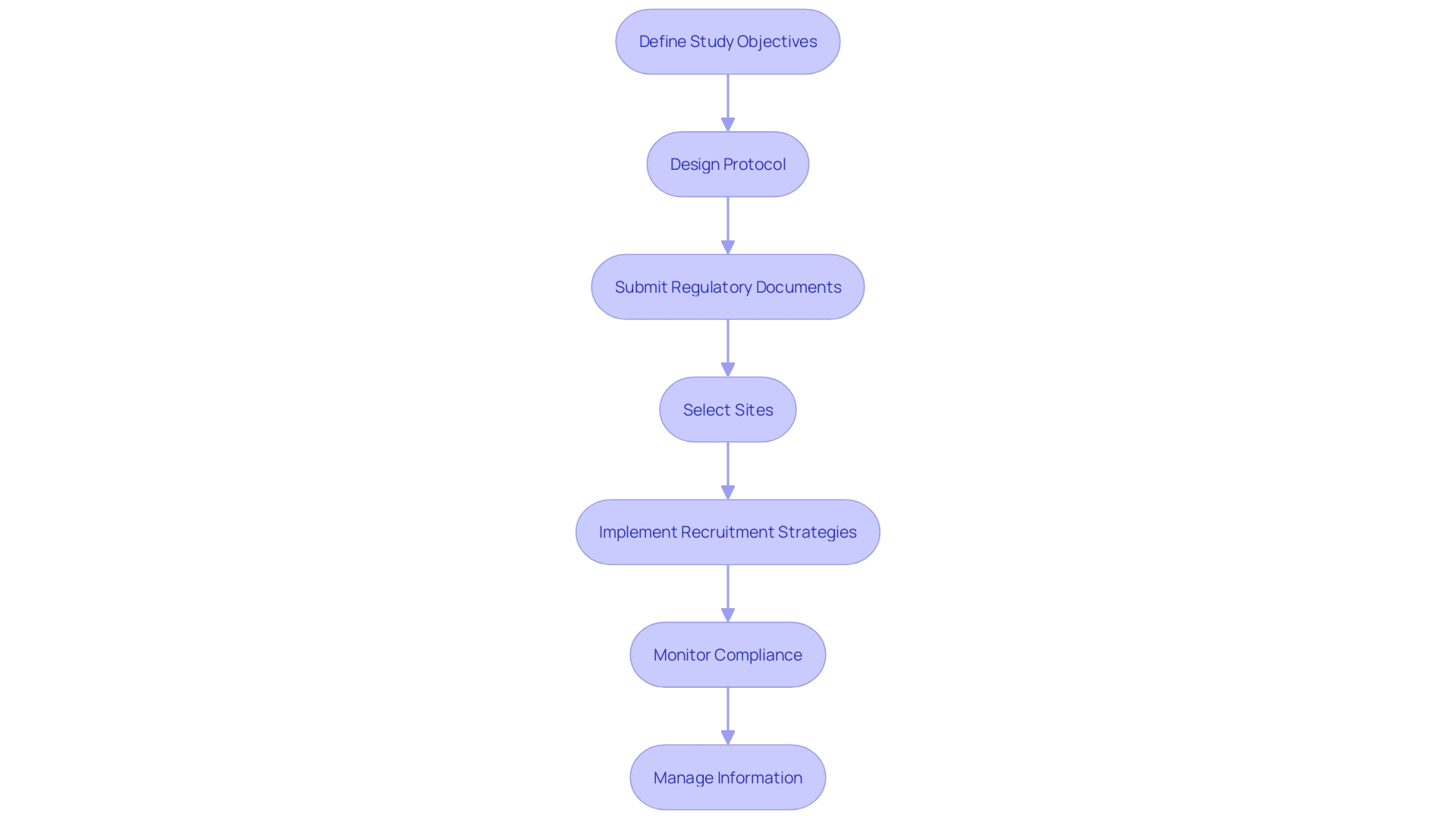
Data management is a cornerstone of medical studies, particularly in the context of medical devices where precision and accuracy are paramount. At bioaccess®, we recognize that effective data management encompasses several critical components, which we expertly navigate through our comprehensive clinical trial management services tailored to Early-Feasibility and First-In-Human Studies:
Data Collection: Utilizing electronic data capture (EDC) systems significantly streamlines the collection process, minimizing errors and ensuring accurate data recording. In Brazil, research trials are increasingly utilizing EDC systems, resulting in more efficient information collection and processing, thus improving the reliability of research outcomes.
Information Validation: Implementing rigorous validation checks is essential to uphold the accuracy and integrity of collected information. This ensures that the information used in analysis is reliable and withstands scrutiny, directly influencing clinical decisions. Our team provides thorough reviews and feedback on study documents to comply with country requirements, ensuring that validation processes meet high standards.
Information Security: Secure information storage is crucial, adhering to stringent protection regulations to maintain confidentiality and compliance. The anonymization time limit for re-evaluation of re-identification risk, typically set at 18-24 months, underscores the importance of high standards in information security, especially in the context of Latin American regulatory environments where such practices are increasingly scrutinized.
Data Analysis: Employing advanced statistical software allows researchers to examine information comprehensively, ensuring that results are both reliable and interpretable. This practice is crucial in converting raw information into meaningful insights that can drive medical advancements, ultimately improving patient outcomes. Our expertise in managing pivotal studies ensures that your analysis is conducted with the utmost precision.
Reporting: Developing detailed reports is vital for communicating findings clearly and transparently to stakeholders. The analysis of the BORN registry information, approved by the Research Ethics Board of the Children’s Hospital of Eastern Ontario Research Institute, illustrates the importance of thorough and ethical reporting practices. As emphasized by a specialist in information management, "Transparent reporting not only meets ethical responsibilities but also fosters confidence in outcomes of studies."
By prioritizing these best practices in information management, bioaccess® significantly enhances the quality of research trials, particularly in navigating the unique regulatory challenges of Latin America. This commitment contributes to the advancement of evidence-based medicine, ensuring that new medical devices and treatments are both safe and effective. Furthermore, as emphasized by leading researchers, "Effective data management is not just a regulatory compliance issue; it is a foundational element that supports the integrity and success of clinical research.
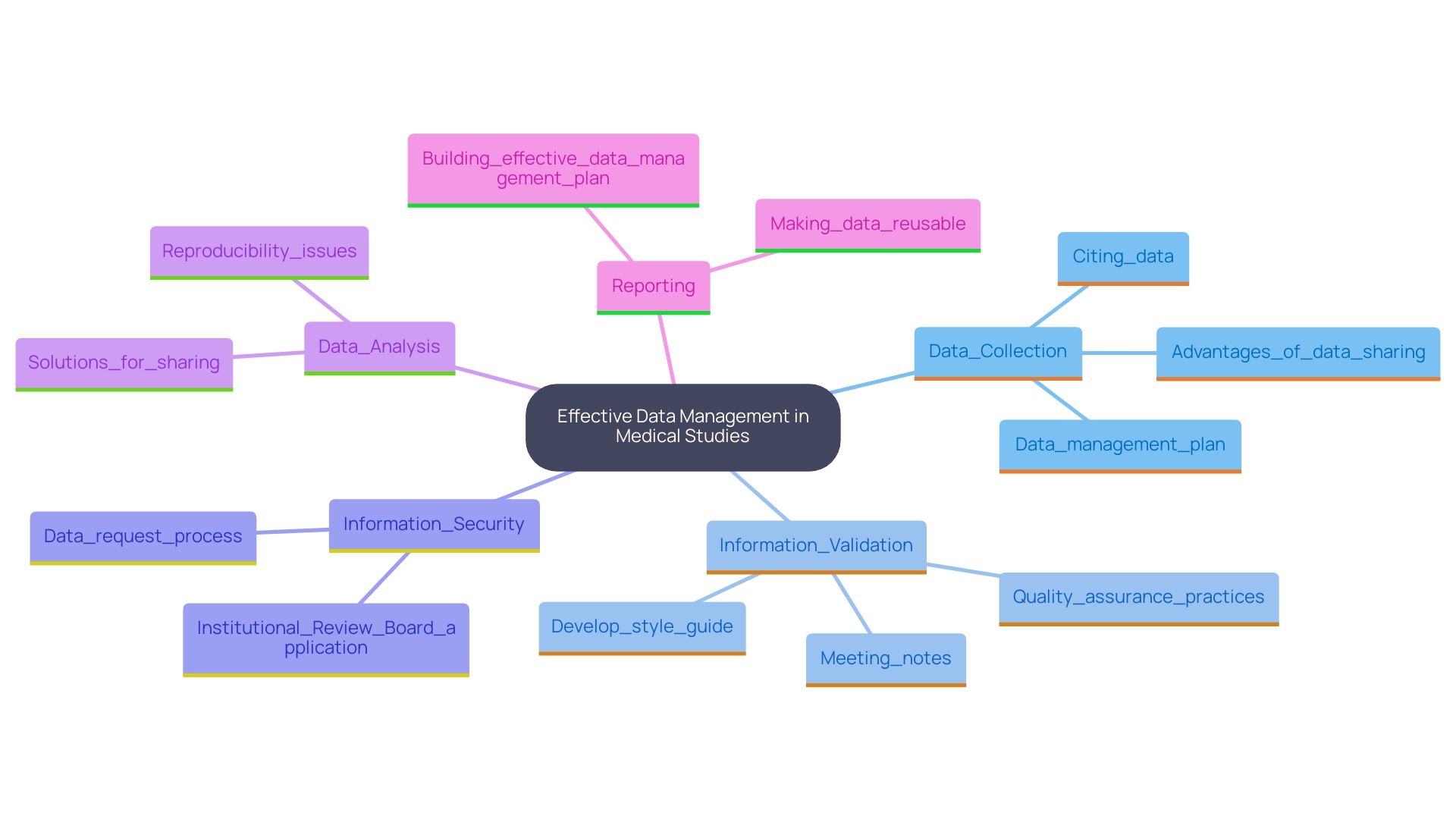
Brazil's recent legislative changes signify a pivotal moment for clinical research, particularly in the realm of medical devices. The new regulations introduced by ANVISA not only streamline the approval process but also enhance transparency and efficiency, aligning Brazilian practices with international standards. This transformation fosters a conducive environment for innovation, allowing researchers to expedite trials and improve patient access to cutting-edge therapies.
The regulatory framework established by ANVISA emphasizes ethical considerations and participant welfare, with over 75% of clinical trials meeting these standards. This commitment to ethical practices is essential for safeguarding participant rights and maintaining the integrity of the research process. By engaging with ethics committees early on, researchers can navigate potential challenges effectively, ensuring compliance and high-quality study management.
Planning a clinical trial in Brazil involves critical steps that require meticulous attention to regulatory compliance and ethical integrity. From defining objectives and designing protocols to ensuring robust data management practices, each phase plays a significant role in the successful execution of trials. As Brazil prepares to host significant international events, the impact of these legislative reforms will not only enhance local clinical research capabilities but also position the country as a leader in the global landscape.
In conclusion, understanding and adapting to the evolving regulatory framework is vital for stakeholders in the clinical research community. By embracing these changes and prioritizing ethical considerations, researchers can harness the full potential of Brazil's clinical trial environment, ultimately contributing to advancements in medical technology and improved healthcare outcomes. The journey ahead promises to be transformative, setting the stage for Brazil to emerge as a key player in the global clinical research arena.
What recent changes have been made to Brazil's research regulations?
Brazil has implemented new regulations by the Brazilian Health Regulatory Agency (ANVISA) to streamline the approval process for studies involving medical devices, focusing on transparency, efficiency, and alignment with international standards.
How do these new regulations benefit researchers and patients?
The legislation allows researchers and institutions to accelerate approvals and enhance patient access to innovative therapies, ultimately improving local medical studies.
What services does bioaccess® provide in relation to clinical trials?
Bioaccess® offers comprehensive trial services, including feasibility studies, site selection, compliance reviews, trial setup, import permits, project management, and reporting, ensuring successful outcomes for various studies.
Why is the use of trusted resources important for medical researchers in Brazil?
Trusted resources are essential for navigating the evolving regulatory landscape and new approval processes, as highlighted by Dr. Eduardo de Oliveira, who emphasizes the impact of tools like UpToDate on the quality of care.
What role does ANVISA play in Brazil's medical studies?
ANVISA oversees the regulatory structure for medical studies, supervising the approval process for research involving medical devices and pharmaceuticals, and ensuring adherence to ethical standards.
What ethical considerations must be taken into account during clinical studies?
Clinical studies must prioritize participant safety and welfare, ensure transparent informed consent, and engage with ethics committees early in the trial design to address potential ethical challenges.
How are partnerships influencing the regulatory landscape in Brazil?
Partnerships, such as between Greenlight Guru and bioaccess™, are enhancing the impact of Medtech research on local economies, including job creation and healthcare improvements.
What are the key steps in organizing a clinical study for medical devices in Brazil?
Key steps include defining objectives, designing the study protocol, regulatory submission, site selection, implementing recruitment strategies, monitoring compliance, and managing information effectively.
What is the significance of data management in medical studies?
Effective data management is crucial for ensuring precision and accuracy in clinical trials, encompassing data collection, validation, security, analysis, and reporting to enhance research outcomes.
How does bioaccess® ensure quality in data management for clinical trials?
Bioaccess® utilizes electronic data capture systems, rigorous validation processes, secure information storage, advanced statistical software for analysis, and detailed reporting practices to maintain high standards in data management.